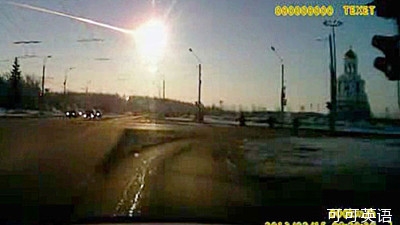Science and technology
科学技术
Dealing with asteroid strikes
应对小行星撞击
A close shave
近地掠过
After a hit and a near miss minds are focusing on the risks from space rocks
在一次撞击和一次近距离擦肩而过后,人们开始关注来自外太空岩石的威胁
One close shave with an asteroid is cause for excitement.
一次小行星近地掠过是一种刺激,
Two on the same day is scary.
同一天发生两次就是惊险了。
On February 15th planet Earth experienced exactly that, as a hunk of itinerant space rock passed by extremely close.
在2月15日,行星地球正经历了这样的惊险:一块流动的大块头太空岩石在咫尺的距离掠过地球,
While another exploded spectacularly in the skies above Russia.
而另一块则十分壮观得在俄国上空爆炸。
 The first asteroid, called 2012 DA14, had been known to astronomers for around a year.
The first asteroid, called 2012 DA14, had been known to astronomers for around a year.
第一颗小行星名为2012 DA14,天文学家在大约一年前发现。
They had calculated that there was no risk of collision. But the 30-metre, 190,000-tonne rock came close: 27,700Km above the surface, inside the orbit of some satellites.
他们计算出小行星的轨道,并无撞击危险。但这枚直径30米、重达190000吨的石块离得是那么近:距地表27,700千米,处于一些卫星轨道内。
It was the nearest ever recorded for an asteroid that size.
对这种大小的小行星,这是有记录以来距离最近的一次。
The second came quite literally out of a clear blue sky, appearing without warning and then disintergrating about 30 seconds later over Chelyabinsk.
第二颗在一片晴空万里中毫无警告得出现了,约30秒后在车里雅宾斯克市上空解体了。
According to NASA, the 10,000-tonne meteor released about 500 kilotonnes of energy when it broke apart, equivalent to the yield of a largish nuclear bomb.
来自NASA的数据显示,这颗10000吨重的陨石在肢解时释放了大约500吨质量的能量,相当于一颗大型核弹的爆炸当量。
Only the height of the detonation-dozens of kilometers up–kept the fatality count at zero, although more than 1,000 people were injured as windows were blown out of buildings.
好在爆炸发生在数十公里的高空,未有人员死亡。虽然有超过1000人受伤,但只是被震碎的建筑物玻璃伤到。
This double whammy has focused minds on the threat from asteroids, something that astronomers have long known is real but which tends to be treated with giggles whenever it is brought outside the lab.
这次双重晦气已引起人们对小行星威胁的关注。长久以来天文学家们就清楚这种实实在在的威胁,但一旦在实验室外提起就会引来哄堂大笑。
Some politicians have nevertheless taken action.
不过还是有些政客们采取了行动。
In 1998 America's Congress ordered NASA to begin cataloguing the very largest, planet killer asteroids-defined as those more than a kilometer across.
美国国会在1998年下令NASA将那些大型的行星杀手级别的小行星编入目录,直径超过1公里的都归入其中。
The agency reckons it has accounted for more than 90% of them.
NASA认为超过90%的这类小行星都已记录在案。
But as the impact from such a beast would be catastrophic, the few undiscovered rocks still represent a threat.
但是由于这种怪兽可能带来灾难性的撞击,少部分未被发现的此类岩石仍然是个威胁。
Deep impact
深度撞击
These days, a mix of national organizations and universities run an alphabet soup of detectors.
目前,一群来自不同国家组织和大学的研究人员开始了初步的探测。
But the field is still a bit of backwater, and budgets are tight.
但是该领域仍是一潭死水,预算很紧张。
John Tonry, an astronomer at the University of Hawaii, is building an asteroid-hunting telescope called ATLAS with $5m from NASA.
John Tonry, 一位来自夏威夷大学的天文学家,正在建造一个名为ATLAS的小行星搜索望远镜,NASA提供了500万美元的经费。
Dr Tonry cannot afford to hire a proper telescope engineer, and is having to design the device himself.
博士Tonry负担不起一个正式的望远镜工程师,必须亲自设计这台望远镜。
ATLAS is intended to spot mid-sized city killers like 2012 DA14.
ATLAS望远镜的目的是为了辨认出类似2012 DA14这样中等大小的城市杀手。
Astronomers reckon the risk from these is at least as great as that from the biggest ones because there are many more of them.
天文学家估测这类小行星的威胁绝不在那些更大的小行星的威胁之下,因为数量实在太多。
Exactly how many more, though, is hard to say because, being small, they are hard to see.
不过至于准确数量却很难说,因为他们实在太小难以被发现。
ATLAS should be able to spot a rock on a collision course a few days before it hits, giving time to organize a hasty evacuation.
ATLAS应该可以提前数天发现一块沿着撞击轨道运行的岩石,争取足够的时间组织快速疏散。
Of course, rather than evacuating the impact zone, it would be better if there were some way to deal with a threatening asteroid more directly, by nudging it into a different orbit.
当然,比起疏散撞击区域,找到一个更直接应对小行星威胁的方法会更好,比如把小行星推入不同轨道。
Asteroid deflection suffers from a even greater giggle factor than asteroid detection, but several ideas have been proposed. One popular method is to use nuclear weapons.
让小行星偏向的想法比小行星探测更会招致哄笑,但已经有人提出了一些主意。
Detonating a nuke near an asteroid's surface could boil away some of the rock and-by Newton's third law of motion-impart a shove in the other direction.
一个通俗的方法是使用核武器。在小行星表面附近引爆一枚核弹可以蒸发掉一些岩石质量。根据牛顿第三运动定律,还会在其他方向产生作用力。
Done early enough, this would shift the object's orbit sufficiently to stop it hitting Earth.
如果爆炸时间足够提前,这足已改变小行星的轨道,防止与地球的撞击。(当然这毫无意义,只是纯粹在卖弄学问罢了。
Alternatively, simply ramming the offending rock might provide enough force to provoke a suitable reaction and change in orbit.
作为另一种选择,针对来犯岩石的很普通的撞击,也许能产生足够的作用力引发反作用力,进而改变轨道。
The European Space Agency plans to launch, in 2015, a spacecraft called Don Quijote that will test the feasibility of doing this.
欧洲航天机构计划在2015年发射名为堂吉诃德的太空船,以测试这种方法的可行性。
Other ideas are more elegant: painting the rock white, for instance, will alter the way it interacts with sunlight, nudging it into a new orbit.
其他的主意要优雅得多:比如把岩石表面涂成白色,这样将改变太阳光对其的作用力,也就改变了运行轨道。
Or rocket motors might be strapped to it, to propel it in a desirable direction. Or a large spacecraft could orbit around it, where its gravity would alter the asteroid's orbit around the sun.
或者在岩石上捆绑一个火箭发动机,将其推向一个想要的方向。再或者发射一个大型太空船绕其运行,太空船的引力将会改变小行星绕太阳运转的轨道。
The trouble is that many of these ideas rely on having plenty of warning. Even small asteroids are big, as 2012 DA14 shows.
问题在于,这里面的很多主意都依赖于充足的预警时间,即使是处理如2012 DA14般的小块头小行星。
That means shifting them at short notice is going to be difficult.
这就意味着,在很短的预知时间下,将很难改变他们的轨道。
When American's National Research Council studied the problem in 2010, it came to the conclusion that even nuclear weapons would require warnings times measured in years or decades.
当美国国家研究委员会在2010年研究这个问题时,得出一个结论:即使是使用核武器也需要数年甚至数十年的预警时间。
Evacuation, it said, was the only feasible option for dealing with little warning. Others are more optimistic.
委员会同时提到,在面对那些很难被辨认出而不期而至的小行星时,疏散是唯一可行的办法。
The day before the explosion over Russia researchers at the University of California, Santa Barbara, proposed putting into orbit a solar-powered laser that could use its beam to vaporize the surface of an incoming asteroid and thus knock it off course, even at a few days' notice.
其他人要乐观一些。就在俄国上空的爆炸发生前一天,来自圣巴巴拉加利福尼亚大学的研究人员提出一个把太阳能激光器发射到小行星轨道的方案,使用激光蒸发掉小行星表面的物质。这样即使只有数天的预警时间,也能使其偏离轨道。
Bet your life?
用你的生命做赌注?
Hard-nosed economists might wonder whether spending money on asteroid research-either for detection or deflection-is really worth it.
精明实务的经济学家也许会怀疑在小行星研究上投资是否物有所值,不管是小行星探测或是轨道偏移。
After all, for all their drama asteroid strikes are rare, and there are plenty of other threats to worry about.
毕竟,小行星撞击是个非常戏剧性且罕见的,而我们还有众多其他的威胁需要担忧。
But the relative lack of information makes the true risk difficult to calculate.
但是由于信息的相对匮乏,真正的风险难以评估。
An asteroid strike is an event with a low probability, but a high death toll when it does happen.
小行星撞击是低概率事件,但是一旦发生,就意味着大量的死亡。
That, as Dr Tonry points out, does funny things to risk calculations.
博士Tonry指出,这让计算风险变得有些奇异。
Our best guess is that you can expect maybe 100 people a year to die from asteroid strikes, he says.
他说,我们最好的估算是,每年大约会有100人死于小行星撞击,
Of course, what that really means is that you might see 100,000 death every thousand years, or 100m every million.
当然,实际上这意味着每隔数千年发生一次10万人的死亡,或者每百万年发生一次1亿人的死亡。
After dodging two potential catastrophes in one day, the world may decide it is better to be safe than sorry.
在一天之内躲过了两次可能的灾难之后,我们的世界也许会决定,安全总比遗憾好。












